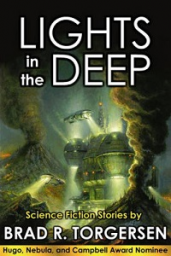 I can count on one hand the number of times that I’ve read a novel in one sitting, and I can’t ever recall reading a short story collection without stopping along the way. There’s too many natural breaks for me to keep turning the pages. But Brad R. Torgersen’s Lights In The Deep captured my attention and held it — at first with his carefully drawn (and very human) characters, and from story to story by the positive emotional uplift and general hope for humanity.
I can count on one hand the number of times that I’ve read a novel in one sitting, and I can’t ever recall reading a short story collection without stopping along the way. There’s too many natural breaks for me to keep turning the pages. But Brad R. Torgersen’s Lights In The Deep captured my attention and held it — at first with his carefully drawn (and very human) characters, and from story to story by the positive emotional uplift and general hope for humanity.
The stories are what you might call part of the superversive movement – all variations on the same theme: normal people in impossible situations who refuse to give up.
In socio-sexual terms, the characters are deltas, the “everymen” of the world who simply do their small part in a greater cause, who hope in the midst of their trials, and model a certain kind of heroism in the process–one that can have profound effects.
In “The Chaplain’s Assistant”, an agnostic cleric in an alien occupied warzone makes a plea for peace and changes the course of history. In “Ray of Light” (2012 Hugo & Nebula nominee), humanity find themselves on the bottom of the ocean after the sun goes out, but a teenager longs to see the surface. In “Outbound” (2011 Analog Readers Choice Award winner), a paraplegic comes of age on a space station after most of humanity is wiped out in war. Overall, a great collection with enough credible science, interesting ideas, and sense of wonder to remind one of the golden age of Sci-Fi.
Torgensen has an essay in the collection where he lays out what he believes to be the answer to the decline in science fiction:
In order for Science Fiction to have value and meaning— to say nothing of an audience— I think it could stand to go back to the “mythic” tropes more than it has of late. Re-explore some of the more classic, more time-honored themes. Re-elevate the human to a place of dignity and power. Re-embrace themes that are hopeful, optimistic, perhaps even spiritual in nature.
I think he’s on to something.
RATING: 8/10
Some people say that progress is more interesting but timeless things endure precisely because they never show progress.
Those addicted to progress are merely attempting to fabricate a less bitter reality.
When they do that they become the thing of nightmares.
Supervert it.
Having read “Lights in the Deep” I reached the opposite conclusion as Scooter’s review.
Each short story is Political Correctness taken to the extreme. Scooter’s review touches on this indirectly, i.e. paraplegic boy is the protagonist, but fails to mention he’s Polish, but adopted by a black couple.
NOTE: minor spoilers follow.
Later you have an alternate history where the first astronaut is black and the copilot is a Jewish woman.
Another story has female marines, a female president and a female commander of the marine company; all in charge of the “tough guy”.
Even the cleric Scooter mentioned won’t tell the aliens about the True God, but hem haws around the subject, even after the alien asks about the cleric’s God repeatedly.
Still, with my dislike of the PC narrative, I could have enjoyed the stories if they had a “point” or a twist or something to make me sit back and ponder. Instead, the stories just end. No “wow” moments, no surprises.
My review is simple. Torgersen writes very well. If PC excites you, then you’ll love these stories.